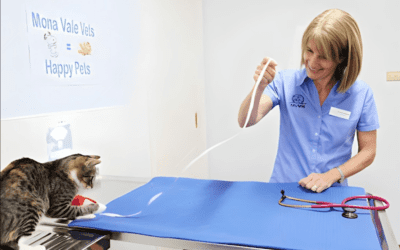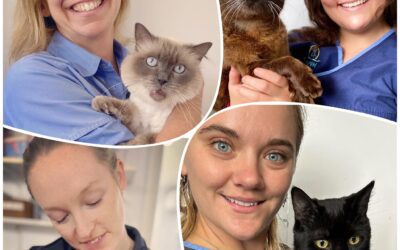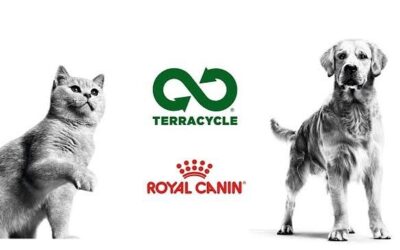Confirmed case of Leptospirosis in a dog that lived in Elanora Heights.
Communication from Northern Veterinary Specialists (NVS)
Most of you are aware of the emerging Leptospirosis outbreak in Sydney. This has largely affected the inner west, but has extended to the North Shore more recently.
Heartbreakingly, we have had our first locally acquired case confirmed yesterday (Elanora area). The variant of the Leptospirosis organism (serovar) involved in this outbreak causes profound illness with a very high mortality rate, therefore diagnosing and initiating treatment early is imperative.
The signs associated with Leptospirosis infection can be very non specific and may include lethargy, vomiting and diarrhoea. Any dog with acute onset illness including any of these signs should be tested immediately:
PREVENTION:
- We are now recommending Leptospirosis vaccination in all dogs across all regions of Sydney.
- A vaccine has to be given twice 2-4 weeks apart and yearly thereafter to ensure protection
- Avoid stagnant water, and contact with rodents where at all possible
At MVVH we believe that all vaccinations need to be carefully considered and tailored to each pets risk status. The WSAVA (World Small Animal Veterinary Association) current recommendations that the vaccine against Leptospirosis is a non-core vaccine. This means that it should only be given if the risks are high enough to warrant its use.
In light of this most recent case, we now consider that the risk status of this area has increased to warrant the vaccination of all dogs who are exposed to the following risk factors (this will apply to MOST dogs in this area);
- Access to puddles of stagnant water where rats may have been
- known ‘ratters’- (dogs who hunt for rats, mice and other rodents)
- dogs who are allowed off leash exercise where rats and other rodents are known to frequent.
Please have a chat with us if you have any concerns about the risk of this disease affecting your dog and want to explore vaccination. We will readily weigh up the risks and benefits and tailor the best vaccination programme accordingly.
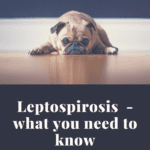

What is Leptospirosis and where does it occur?
Leptospirosis is a peculiar type of bacteria that has many sub-types (or serovars). It is found in many parts of the world and tends to be found in warmer areas. Its primary host is usually rodents such as rats and the bacteria can multiply in the host which then shed hundreds of bacteria in their urine.
It is most commonly seen in rural areas on farms where there is lots of grain storage which provides a perfect breeding ground for rats.
How does a dog become infected?
The bacteria can be swallowed, or invade damaged skin or even be sniffed up by dogs. Usually this happens when a dog drinks from a stagnant body of water that a rat has urinated in, such as a puddle in a construction site.
What signs does it cause in affected dogs?
Once the bacteria invade the dog’s blood stream, it can travel to the kidneys and/or the liver and cause significant damage to these organs. The damage can be so extreme that it is often fatal.
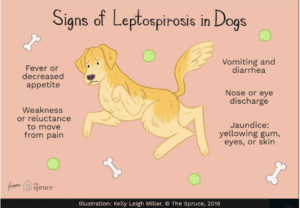

Can it affect other species ?
Yes, other animals can also become hosts for the bacteria such as cats but they do not seem to suffer such ill effects and rarely become ill. However, it is a serious health concern for people as they can be affected in much the same way as dogs. Severe infections can similarly cause kidney and liver failure in people.
How are people infected?
Leptospirosis is a Zoonotic disease. That means it can be spread to humans. Humans can get Leptospirosis through direct contact with urine from infected animals or through water, soil or food contaminated with their urine.
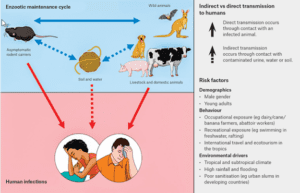

How can I protect my dog?
The best way to protect your dog (and yourself) is to avoid contact with rat urine, do not let your dog drink from any stagnant water where rats have been and avoid taking your dog for walks around inner city construction sites.
If you cannot avoid these risks then getting your dog vaccinated will provide protection. A series of two booster vaccines given 2-4 weeks apart provides immunity for 12 months; continued immunity is achieved by annual boosters. The vaccine appears to be very safe and has been widely available and used overseas and in rural Australia for many years.
Updated 25th August 2020
Communication from the Sydney University Veterinary Teaching Hospital (UVTHS):
“There has been another confirmed case of Leptospirosis in a dog that lived in Crows Nest. The dog was not vaccinated against Leptospirosis and sadly had to be euthanised due to kidney failure. This is the first case of Leptospirosis seen in Crows Nest. Last year we saw 8 cases between May and November and these dogs lived in Surry Hills, Darlinghurst, Glebe and Redfern.
Importantly, we have not seen any infected dogs which have been vaccinated against Leptospirosis. Therefore, please vaccinate your dog against Leptospirosis if you live within a 5km radius of Surry Hills, in Balmain, Crows Nest or its immediately surrounding suburbs or if your dog is in contact with rats. A vaccine has to be given twice 2-4 weeks apart and yearly thereafter to ensure protection.”
Further information can be found on the Sydney University Veterinary Teaching Hospital (UVTHS) Facebook page
Updated 14th August 2020:
Communication from the Sydney University Veterinary Teaching Hospital:
“There has been another confirmed Leptospirosis case from Balmain this week. The dog had been in contact with rats and was not vaccinated against Leptospirosis. The dog is still in hospital but appears to be recovering. This is the first reported case of Leptospirosis from Balmain. Last year we saw 8 cases between May and November and these dogs lived in Surry Hills, Darlinghurst, Glebe and Redfern.
Therefore, we recommend vaccination against Leptospirosis in dogs living within a 5km radius of Surry Hills, in Balmain or its immediately surrounding suburbs or if the dog is in contact with rats.
Updated 6th August 2020:
Communication from the Sydney University Veterinary Teaching Hospital:
“Sadly, there has been another confirmed case of Leptospirosis this week in a dog living in Newtown. The dog was not vaccinated against Leptospirosis and sadly had to be euthanised due to severe kidney failure. This is the first case of Leptospirosis this year and the first case reported in Newtown. Last year we saw 8 cases from May to November and these were from Surry Hills, Darlinghurst, Glebe and Redfern.
Importantly, we have not seen any infected dogs which have been vaccinated against Leptospirosis. Therefore, please vaccinate your dog against Leptospirosis if you live within a 3km radius of Surry Hills, in Newtown or its immediately surrounding suburbs or if your dog is in contact with rats. A vaccine has to be given twice 2-4 weeks apart and yearly thereafter to ensure protection”
Updated 7th February 2020:
Communication from the Sydney University Veterinary Teaching Hospital:
There have been no further cases of Leptospirosis reported since December. The total case number is now 11 with 8 cases diagnosed since May 2019. All dogs were from Surry Hills, Darlinghurst, Redfern and Glebe and all died or were euthanised.
It is important to note that the recent weather (warm with heavy rainfall) may result in conditions conducive to another increase in case numbers. Therefore, please remain vigilant!
Updated 7th December 2019:
Communication from the Sydney University Veterinary Teaching Hospital:
“Sadly, there has been another confirmed case of Leptospirosis this week in a dog living in Surry Hills. Recently, we were able to confirm another recent case of Leptospirosis in another dog from Redfern who died in September. Both dogs were not vaccinated against Leptospirosis and both had to be euthanised due to severe kidney failure. In both cases the strain (serovar) Cophenhageni could be confirmed. This is the serovar against which a vaccine is available. This brings the total case number of infected dogs to 11 in total – 8 have been seen since May this year and all of the dogs have died.
Importantly, we have not seen any infected dogs which have been vaccinated against Leptospirosis. Therefore, please vaccinate your dog against Leptospirosis if you live within a 3km radius of Surry Hills or if your dog is in contact with rats. Due to the increased demand for vaccinations there is currently a supply problem – so please contact your veterinarian to make sure that the vaccine is in stock. A vaccine has to be given twice 2-4 weeks apart and yearly thereafter to ensure protection.”
Updated 18th October 2019:
Communication from the Sydney University Veterinary Teaching Hospital:
“Sadly, there has been another confirmed case of Leptospirosis diagnosed in a dog living in Darlinghurst. The dog was not vaccinated against Leptospirosis. He was treated at another specialist clinic in the Inner West and died on the 14th of October. We are currently investigating which strain (serovar) was involved.
A reminder that it is currently recommended to vaccinate dogs living in areas within a 3km radius around Surry Hills, dogs that go for walks in this area and dogs living in the wider inner west that are known “ratters”. Two vaccines need to be given 2-4 weeks apart.”
For those dogs considered at risk, we have the Leptospirosis vaccine available. Please call us on 9999 2269 to discuss your dogs needs or to make an appointment.
Updated 20th August 2019:
A summary of the latest Information from the Sydney University Veterinary Teaching Hospital
” Unfortunately another dog has died from Leptospirosis at our hospital on the 10th of August. The case was confirmed as a definite positive last week and we were able to identify serovar Copenhageni as the strain of Leptospira infecting this dog. Copenhageni is the serovar that we are currently vaccinating dogs for. This case brings the case number up to 7 confirmed cases. Two cases were detected last year and there have been five cases since May this year. Unfortunately all of these dogs have died or required euthanasia due to a poor prognosis. Cases were all confined to Surry Hills, Darlinghurst, Redfern and Glebe. Reports of cases from other areas are false. “
More information can be found on the UVTHS Facebook page
Updated 4th August 2019:
Many of our concerned clients have asked about the recent cases of Leptospirosis seen in 6 dogs located in the Inner Sydney area.
What is Leptospirosis and where does it occur?
Leptospirosis is a peculiar type of bacteria that has many sub-types (or serovars). It is found in many parts of the world and tends to be found in warmer areas. Its primary host is usually rodents such as rats and the bacteria can multiply in the host which then shed hundreds of bacteria in their urine.
It is most commonly seen in rural areas on farms where there is lots of grain storage which provides a perfect breeding ground for rats.
How does a dog become infected?
The bacteria can be swallowed, or invade damaged skin or even be sniffed up by dogs. Usually this happens when a dog drinks from a stagnant body of water that a rat has urinated in, such as a puddle in a construction site.
What signs does it cause in affected dogs?
Once the bacteria invade the dog’s blood stream, it can travel to the kidneys and/or the liver and cause significant damage to these organs. The damage can be so extreme that it is often fatal.
Can it affect other species ?
Yes, other animals can also become hosts for the bacteria such as cats but they do not seem to suffer such ill effects and rarely become ill. However, it is a serious health concern for people as they can be affected in much the same way as dogs. Severe infections can similarly cause kidney and liver failure in people.
How are people infected?
Leptospirosis is a Zoonotic disease. That means it can be spread to humans. Humans can get Leptospirosis through direct contact with urine from infected animals or through water, soil or food contaminated with their urine.
Is it a problem in the Northern Beaches?
No cases of Leptospirosis have been isolated on the Northern Beaches. It is supposed that the recent bout of infections in Inner Sydney city were likely due to rats breeding in construction sites and recent rains flushing their urine into puddles that dogs have subsequently been exposed to.
How can I protect my dog?
The best way to protect your dog (and yourself) is to avoid contact with rat urine, do not let your dog drink from any stagnant water where rats have been and avoid taking your dog for walks around inner city construction sites.
If you cannot avoid these risks then getting your dog vaccinated will provide protection. A series of two booster vaccines given 2-4 weeks apart provides immunity for 12 months; continued immunity is achieved by annual boosters. The vaccine appears to be very safe and has been widely available and used overseas and in rural Australia for many years.
At MVVH we believe that all vaccinations need to be carefully considered and tailored to each pets risk status. The WSAVA (World Small Animal Veterinary Association) current recommendations that the vaccine against Leptospirosis is a non-core vaccine. This means that it should only be given if the risks are high enough to warrant its use. Currently, we believe the risks are low and so we are not routinely recommending vaccination for most dogs.
However, this is something we are monitoring and will change our recommendations if the risk status increases in this area. We have access to the vaccine and will definitely be recommending it to high risk dogs.
Please have a chat with us if you have any concerns about the risk of this disease affecting your dog and want to explore vaccination. We will readily weigh up the risks and benefits and tailor the best vaccination programme accordingly.




